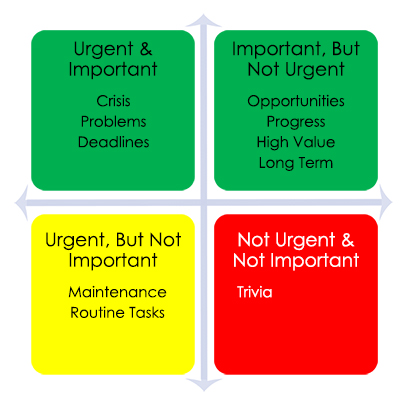Overcome Procrastination – NOW!
Don’t blame it on the Internet. Procrastination dates back to ancient civilization. The Greek poet Hesiod wrote around 800 B.C. not to put your work off until tomorrow and the day after.
There are many reasons why people tend to procrastinate:
- No clear deadline
- Inadequate resources available (time, money, information, etc.)
- Don’t know where to begin
- Task feels overwhelming
- No passion for doing the work
- Fear of failure or success
The ability to select your most important task at any given moment, and then execute that task both quickly and well, will probably have the greatest impact on your success more than any other quality or skill you can develop! If you nurture the habit of setting clear priorities and getting important tasks finished efficiently, the majority of your time management issues will simply fade away.
Assuming that you have already established the foundation of successful time management (setting goals, committing to a calendar, and maintaining focus, as detailed in my last blog post) here are simple ways to overcome procrastination:
- Delete it. What are the consequences of not doing the task at all? Consider the 80/20 rule, that 80% of your results come from only 20% of your actions. Maybe the task doesn’t need to be done in the first place.
- Delegate. If the task is important, ask yourself if it’s really something that you are responsible for doing. Know your job description and ask if the task is part of your responsibilities. Can the task be given to someone else?
- Ask for advice. Asking for help from a trusted mentor, supervisor, coach, or expert can give you some great insight on where to start and the steps for completing a project.
- Chop it up. Break large projects into milestones, and then into actionable steps. As Bob Proctor says, “Break it down into the ridiculous.” Huge things don’t look as big when you break it down as small as you can.
- Obey the 15-minute rule. To reduce the temptation of procrastination, each actionable step on a project should take no more than 15 minutes to complete.
- Have clear deadlines. Assign yourself a deadline for projects and milestones and write it down in your day planner or calendar. Make your deadlines known to other people who will hold you accountable.
- Give yourself a reward. Celebrate the completion of project milestones and reward yourself for getting projects done on time. It will provide positive reinforcement and motivate you toward your goals.
- Remove distractions. You need to establish a positive working environment that is conducive to getting your work done. Remove any distractions.
- Do it now. Do your most important task as early in the day as possible. EAT THAT FROG!
Why would anyone ever eat a frog? If the first thing you do each morning is to eat a live frog, you can go through the rest of the day knowing the worst thing likely to happen to you all day is already over. Your frog is the task that will have the greatest impact on achieving your goals, and the task you are most likely to procrastinate starting.
On a related note, “If you have to eat two frogs, eat the ugliest one first!” This is another way of saying that if you have two important tasks before you, start with the biggest, hardest, and most important task first. Discipline yourself to begin immediately and then to persist until the task is complete before moving on to something else. Resist the temptation to start with the easier task. You must also continually remind yourself that one of the most important decisions you make each day is your choice of what you will do immediately and what you will do later, or postpone indefinitely. It is OK to say no to requests from others that are in conflict with your goals.
Finally, “If you have to eat a live frog, it does not pay to sit and look at it for a very long time!” The key to reaching high levels of performance and productivity is to develop the lifelong habit of tackling your major task first thing each morning. Don’t spend excessive time planning what you will do. You must develop the routine of “eating your frog” before you do anything else and without taking too much time to think about it.
Successful, effective people are those who launch directly into their major tasks and then discipline themselves to work steadily and single-mindedly until those tasks are complete. In the business world, you are paid and promoted for achieving specific, measurable results. You are paid for making a valuable contribution. But many employees confuse activity with accomplishment and this causes one of the biggest problems in organizations today, which is failure to execute.
by Christine Spray
Photo: ID 57946835 © Jakub Jirsák | Dreamstime.com




